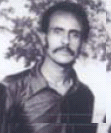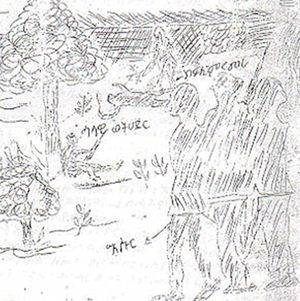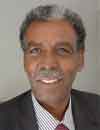As a legacy of the founders of the ELF leaders, in the early 1970s when
many progressive Eritrean students from
Addis Ababa Hailesellase University joined the EPLF were also not welcome
to the EPLF leaders. This was because Mussie, Yohannes and other students
who came from university inside Ethiopia were far more progressive fighter
than those who separated from ELF. Mengsteab (2005:51) gave a full explanation
for this in following his word as follows
“According to some accounts, Isaias was never comfortable with the
new arrivals from Addis Ababa, especially with Mussie and Yohannes".
Additinally Mussie, Yohannes and their followers were reputed to have
been colourful debaters. By contrast, Isaias was said to hate open ideological
debate. His style was to use frequent clichés to disparage the
ideas and arguments of his opponent, and to use physical force to intimidate
his opponents during discussion. “
According to Markakis (1987: 136) Muse Tesfai Mikael, a talented agitator
and skilled dialectician who had honed these skills in the student movement.
In recognition of his talents, he was put in charge of political education
in the training camp, where he gained a reputation among the recent recruit
intake . They rallied to his side when he led the challenge to the ELF-PLF
leadership in the autumn of 1973, demanding, inter alia, the election
of a committee to supervise the actions of the leadership, the participation
of all members in decision-making, the election of units, and similar
demands which the leaders denounced as anarchist.
Megesteab (2005:64) wrote that Isaias was partially successful
in brainwashing a large number of his political operatives that the opposition
was an Akele Guzai undertaking despite Mussie and Yohannes
were too internationalist in their outlook so as not to blindly fall
into regionalist trappings.
Using regionalism as a card against progressive fighters in 1973, 1976
and 1978, many progressive fighters were physically eliminated by the
EPLF leaders between 1973-1980. Regarding this, Teklay Aden, an EPLF security
chief who defected to the Ethiopian regime in 1981, revealed that three
thousand fighters were physically liquidated by the Front between 1973
and the time of his defection 1980.

In 1974 to 1976 when many university graduates and students joined the
EPLF, they too were not made welcome by the EPLF leaders, and anyone whose
background was of a student or graduate was under close surveillance since
s/he was in trainng. This was also confirmed by Adhanom
Fitwi, Adhanomin his interview with Aida Kidane in 2004 described
the circumstances of the 1974 in the following:
"
When I joined the EPLF in 1974, the Menkae movement had already started
in September 1973,
and
I found the leaders of Menkae in prison. I was a student at the Addis
Ababa University and
we knew nothing about the Menkae. Very few people knew of it. And in the
field immediately we
were suspected without justification of sympathizing with the Menkae movement
- because we came
from Addis Ababa University. This made us concerned" Read
more.
The attitude of the E.P.L.F toward the educated
fighters in the EPLF

This was exacerbated in 1976 when Goitom Berhe, a law
graduate of Addis Ababa, and his groups tried to form an underground movement
called 'the Eritrean Revolutionary Party' in 1975/1976.
'the Eritrean Revolutionary Party' translated a number of Marxist works
to Tigrigna (eg Dialectical Materialism, Four Essays of Philosophy, about
the Proletariat Party), and all the literature was then collected and
burnt.
According to Fitwi (2004), Goitom was sent to Nakfa area, of Tigre speaking
area with only one rank (MesRie) of 8 members and actually he did not
speak Tigre language. Then he was confined there for some time. And there
he wrote an article 'Who is the revolutionary?'
handwritten in 30 pages. I and Alem Abraha read it at night with kerosene
lamp, though it was forbidden to read the article. About two weeks from
then, Goitom was taken away and never seen again. Alem Abraha was soon
taken and killed.



Case
of Alem Abraha Case
of Tekle Wedi Keshi Case
of Twelde
The suspected ring-leaders of Eritrean Revolutionary Party'were arrested
and later executed. Some of the victims included:
1)Goitom Berhe, executed in 1978 at Gerger; 2)Mesih Russom,
executed in 1980 at Arag ;3) Tewolde Eyob, executed
in 1980 at Arag ; 4)Teclai Ghebre-Kristos, executed in
1980 at Arag ; 5)Michael Bereketeab,executed in 1980
at Arag ; 6) Haile Yohannesom, executed in 1980 at Arag
; 7) Samuel Ghebre-Dingil, executed in 1980 at Arag ;
8)Bereket Haile, executed in 1980 at Arag ; 9) Memhir
Tecle Habte-Tsion, executed in 1980 at Arag ;
10) Alem Abraha, executed in 1980 at Arag and others.
It is good to mention that in 1970s the educated fighters were categorized
in two groups, the first groups who opposed the leadership such as the
Menka groups or Bistay Goitom were called by Intellectual opportunists
by the Front. The second group of educated fighters who played a great
role in collaboration with the Front in eliminating those progressive
fighters were called Intellectual revolutionaries by the Front. The intellectual
revolutionaries collaborated with the Front either directly like Dawit
Habtu and Mussa Nibe who were both Law students and staff of Halewa Sewra,
or indirectly like Haile Menkerios who translated a number of Marxist
works to tigringna while all Eritrean Revolutionary
Party' translated Marxist books were collected and burnt.
1975/1976 the author of this paper was in the Information department and
I remember that when Haile Menkorias translated a number of Marxist works
to tigringna (eg, State and Revolution , The Communist Manifesto, two
step backward and one step forward and some of Mao works which I could
not remember the title exactly, and we did all the process of printing
and package of the publication althought it was not allow to read them
because we were ordinary members not only this but also if you tried to
read some of the Marx works, you would be in target on these days.
Sherman( 1980:64) also stated that in 1976 perhaps as many as 200 young EPLF intellectuals were arrested. Many were executed for “radicalism” for following an alleged Maoist line or sometime known as Bitsay Menkiskas.
In the 1970s the victime of the EPLF leaders were not only Menka and Bitsay
Menkiskas but also Yemanawyan Menkiskas( Right wing) as the continuation
of the democratization movement this movement against corruption in 1977-1978
when most of the town liberated by the EPLF.
Among those persons killed for having said a word or two in criticism
against corruption of the ruling clique were- 1) Dr Eyob Ghebre-leul,
educated in the USSR, executed in 1980 at Arag ; 2) Mehari
Ghirma-Tsion, educated in the USSR who joined the EPLF withHaile Menkorias
1972, executed in 1980 at Arag ; 3) Ghebre-Michael Meharizghi;
Addis Abeba university graduate, executed in 1980 at Arag ;
4) Hibret Tesfa-Ghaber, executed in 1980 at Arag ; 5)
Kidane Abeito, executed in 1980 at Arag ; 6) Fissehaye
Kidane (Germen), executed in 1980 at Arag ; 7) Haile
Jebha, former EPLF interrogation section chief, executed in 1980
at Arag ; 8) Araya Semere, executed in 1980 at Arag ;
9) Ammanuel Filansa; 10) Solomon Wolde-Mariam, key EPLF leader between
1970-1977,executed in 1988 at Hishkeb and, others. Mogos
Fassil, Addis Ababa law graduate, narrowly escaped death by fleeing from
gun-point.
Adhanom Ftiwee also stated that meeting or seeing former Addis University students in the field became a rarity, unless they were connected with the EPLF leadership, otherwise they were taken away being accused as a member of this and that movement and affiliations.
Despite the EPLF leaders and their colloborators accused the ELF of killing innocent and democratic fighters but none of them have acknowledged the crime committed by the EPLF.

However, he has never come forward to acknowledge the EPLF leader’s crime against innocent fighters for expressing their opinions in the 1970s and 1980s while he was a member of the Central Committee.




ተስፋልደት ሚኪኤል “ቀሃስ” ዝጽዋዕ ጥቓ ወ.ወ.ክ.ማ.ዕዳጋሓሙስግዝኡዝነበረ
የማነ “ተንሽን” ካብ ደቀምሓረ
ኣማኑኤል ተስፋሁነኝ “ቀይሽብር”
ኣማኑኤል ልጃም
ኣማኑኤል ጳውሎስ (ካብቶም ንጂ15 ክእሰሩ እንከለዉ ኣብ ላንድክሩዘር ዝጽበ ዝነበረ
“ታንዱር”
ወልደዝጊ
ወዲ ዋስዕ;ተኪኤ “ወዲ ቐሺ” ካብ ዓዲ ንፋስ (ንኢትዮጵያ ኢዱ ሂቡ፡ ድሓር ብሱዳን ኣቢሉ ናብ ኣሜሪካ፡ ካሊፎርንያ ዝኸደ)
ኮሎነል ስምኦን ገብረድንግል
ጋይም ተስፋሚኪኤል (ኣብ ሃገራዊ ድሕነት ናይ ወጻኢ ጉዳያት ሓላፊ ዘሎ)
ጸጋይ ይስሃቅ (ተመሃራይ ዝነበረ፡ ናብ ተ.ሓ.ኤ ዝሃደመ) ይርክብዎም።
ካብዚኣቶም ድሕሪ ነጻነት መዝነት ዝረኸቡ ኣለዉ። ብ1970ታት ቅድሚ ናብ ኢትዮጵያ ምስላሙ፡ ናይ ሓለዋ ሰውራ ሓላፊ ተኽላይ ወልደማርያም “ዓደን” ኔሩ። ብድሕሪኡ ሓለዋ ሰውራ ናብቲ ብ2007 ዝሞተ ዓሊ ስዒድ ዓብደላ ተመሓላሊፉ። ሌተና ኮሎነል ጸጉ መን እዩ?
Teklay Aden described Halewa
Sewra in the following:
”The most criminal and notorious organ
within the EPLF is known as 'Halewa Sewra or the security department:”



This was despite Ali’s crimes in the 1970s and 1980s. Click here to see the evidence of his crime.
As mentioned earlierAbdella Adem has never come forward to acknowledge the EPLF leader’s crime against innocent fighters for expressing their opinions in the 1970s and 1980s while he was a member of the Central Committee.
Purging, liquidation and killing in suspicious circumstances like those
of Weldekel Haile did not stop after 1980 and there were more stories
of fighters who were killed in suspicious circumstances in the mid 1980s,
for example Issayas Tewelde ( Wedi-Flansa), Fisehya Woldegebrel, Ibrahim
Afa and others.
Generally, the number of fighters who were killed by the EPLF during the
liberation struggle was much highter than the number of fighters who killed
in the two years civil war 1972-74. According to Mengisteab (2005: 50)
the number of fighters physically eliminated by the Front between 1973
and the liberation of Eritrea in 1991, could range between three thousand
and five thousand, if those fighters who disappeared under mysterious
circumstances are included.
In conclusion, the author appeals to all former members of the EPLF who
survived the war, especially those who were in the Central Committee between
1977-1987 (Abdella Adem, Haile Menkerios, Mesfin Hagos and Andebrhan Wolde
Giorgis ) and other senior post holders, especially members of the 72
( the EPLF Intelligent Centre ) to tell the public the truth about the
EPLF leadership’s crimes against innocent fighters.

Contact: rkidane@talk21.com